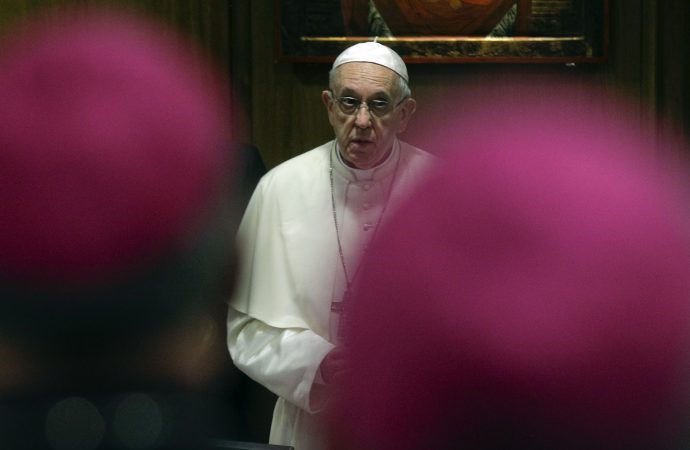Despite calls in some quarters to put October’s Synod of Bishops on hold due to abuse scandals effecting his papacy, Pope Francis has given no indication that he intends to call off the event, and with Saturday’s publication of the official list of participants, the gathering seems set to proceed as planned.
As usual, the list of some 300 cardinals, bishops, priests, religious and lay participants who will be present includes every region around the world, named for the most part by bishops’ conferences, or the pope himself.
In addition to a 15-member ordinary council organizing the synod, elected by participants at the close of the 2015 Synod on the Family, the list this year includes some 151 delegates named by bishops’ conferences and 39 papal appointees, in addition to the heads of all Vatican departments, the auditors, representatives from Eastern Churches and representatives named by the Union of Superior Generals.
Prelates named by Francis for this year’s Synod on Young People, Faith and the Discernment of Vocation, set to take place in Rome Oct. 3-28, represent not only his attention to social issues and global peripheries, but are also close papal allies.
Among the pope’s appointees are Cardinals Reinhard Marx of Munich and President of the German bishops’ conference; Blase Cupich of Chicago; Joseph Tobin of Newark, NJ and Angelo De Donatis, Vicar of the Diocese of Rome, all of whom, apart from Marx, got their red hat from Francis. All are seen as close papal confidants.
Also noteworthy are Francis’s appointments of Father Antonio Spadaro, director of Jesuit-run journal La Civilta’ Cattolica and a close papal friend, and Father Michael Czerny, undersecretary for the migrants and refugees section of the dicastery for Integral Human Development, which is overseen by Francis directly.
Other significant names on the list are Cardinal Gerald Cyprien LaCroix of Quebec, Canada; Cardinal Giuseppe Bertello, president of the Governorate of the Vatican City State; Archbishop Vincenzo Paglia, president of the Pontifical Academy for Life and grand chancellor of the newly-established Pontifical John Paul II Institute for Marriage and Family Sciences; Archbishop Matteo Maria Zuppi of Bologna; Archbishop Mario Enrico Delpini of Milan; and Archbishop Peter Andrew Comensoli of Melbourne.
The papal delegates, unsurprisingly, also include a number of cardinals and prelates, many of whom got a red had from Francis, from small or obscure dioceses without a large Catholic presence, or where the Church faces hardship.
Among these are Cardinal Charles Bo of Yangon, Myanmar, where Francis travelled last year in a show of support for the nation’s small Catholic presence and to address the Rohingya refugee crisis boiling between Myanmar and neighboring Bangladesh.
Many also hail from places the pope has paid close attention to and has been vocal in advocating for, such as Cardinal Dieudonné Nzapalainga of Bangui in the Central African Republic; Cardinal Carlos Aguiar Retes of Mexico City; Archbishop Pierbattista Pizzaballa, apostolic administrator of Jerusalem; Archbishop Fridolin Ambongo Besungu, coadjutor archbishop of the Democratic Republic of the Congo; and Cardinal Joseph Coutts of Karachi, Pakistan.
Others called in from the global margins include Cardinal Daniel Fernando Sturla Berhouet of Montevideo, Uruguay; Cardinal Arlindo Gomes Furtado of Cape Verde; Cardinal John Ribat of Port Moresby, Papua New Guinea; Cardinal Luis-Marie Ling Mangkhanekhoun, apostolic vicar in Ventiane, Laos; Cardinal Desire Tsarahazana of Toamasina, Madagascar; and Archbishop Gabriel Mbilingi of Lubango, Angola.
Some of the pope’s appointees, such as Cardinal Jose Luis Lacunza Mastrojuan of David, Panama, are expected, as he’s playing a key role in organizing the global World Youth Day event set to take place in Panama in January, but there were a few surprises on the list.
One surprise was Monsignor Marco Frisina, director of the Musical Chapel at the Basilica of St. John Lateran in Rome and director of the diocesan choir of Rome, who has written several scores of music for papal liturgies and who’s pretty much a celebrity among Catholics in Rome.
The pope’s attention to social issues can also be seen in these appointments, particularly that of Father Robert Stark, director of the office for Social apostolate in Honolulu, and Father Giacomo Costa director of the magazine Aggiornamenti Sociali, president of the “San Fedele Cultural Foundation” and vice president of the “Carlo Maria Martini Foundation.”
Other natural appointments include priests who work directly in youth apostolates, whether in the Vatican, in academia, or in dioceses, including Father Alexandre Awi Mello, secretary for the Vatican dicastery for Laity, Family and Life, and Father Rossano Sala, professor of youth pastoral at the Pontifical Salesian University and director of the Italian magazine Note di Pastorale Giovanile.
Other noteworthy papal delegates include Archbishop Jean-Claude Hollerich of Luxembourg; Bishop Eduardo Horacio Garcia of San Justo, Argentina; Bishop Lazzaro You Heung-Sik of Daejeon, South Korea; Bishop Lucas Van Looy of Gent, Gand, in Belgium; Bishop Claudio Cipolla of Padua; Marian Florczyk, auxiliary bishop of Kielce, Poland; and Monsignor Mariano Fazio, Vicar General for the Prelature of Opus Dei and Vice Grand Chancellor for the Pontifical University of the Holy Cross in Rome.
Other key American names elected by bishops’ conferences are Cardinal Daniel DiNardo, archbishop of Gavelston-Houston and president of the U.S. bishops’ conference, and Archbishop Jose Gomez of Los Angeles, vice president of the USCCB.
Both prelates were in Rome Thursday for a meeting with Francis to discuss a possible apostolic visitation looking into the scandals surrounding ex-Cardinal Theodore McCarrick and his rise to power in the U.S., despite common knowledge of his sexual misconduct with seminarians.
However, to date, no information has been released on the meeting, nor has there been an indication from the U.S. bishops or the Vatican as to whether a visitation will in fact take place, or when.
Bishop Robert Barron, auxiliary bishop of Los Angeles, was also tapped by the USCCB to participate in the synod. Barron’s known for his numerous digital media initiatives and as an engaging speaker.

